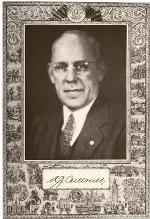 Adrian Joseph Caillouet, a native of the Lafourche-Terrebonne Parishes area of the Eastern District of Louisiana, was one of two judges to serve the court during World War II. Judge Caillouet was born into a devout Roman Catholic family in Thibodaux, Louisiana, on February 19, 1883. His father was Lucien P. Caillouet, who was the owner, editor, and publisher of Thibodaux's local newspaper, The Sentinel, before becoming a member of the Louisiana bar and winning election as a state court judge, first to the trial court and then to the state court of appeals. His mother was the former Marie Adele Lagarde. The couple had ten children, including one who became a Carmelite nun, one who became a parish priest and pastor of several Louisiana Catholic churches, and another who became Auxiliary Bishop of the Archdiocese of New Orleans.
Adrian Joseph Caillouet, a native of the Lafourche-Terrebonne Parishes area of the Eastern District of Louisiana, was one of two judges to serve the court during World War II. Judge Caillouet was born into a devout Roman Catholic family in Thibodaux, Louisiana, on February 19, 1883. His father was Lucien P. Caillouet, who was the owner, editor, and publisher of Thibodaux's local newspaper, The Sentinel, before becoming a member of the Louisiana bar and winning election as a state court judge, first to the trial court and then to the state court of appeals. His mother was the former Marie Adele Lagarde. The couple had ten children, including one who became a Carmelite nun, one who became a parish priest and pastor of several Louisiana Catholic churches, and another who became Auxiliary Bishop of the Archdiocese of New Orleans.
After studying in Catholic schools in Thibodaux, Judge Caillouet earned his bachelor's degree in 1902 from St. Mary's College in Lebanon, Kentucky, which also awarded him an honorary Master of Arts degree in 1921. He "read law" in his father's law office in Thibodaux before passing the Louisiana bar in 1913. He practiced law in both Thibodaux and Houma, where he eventually moved his family and residence. In Houma, he befriended for life an attorney whose private law office was located next door to his own. That lawyer and life-long friend was Allen J. Ellender. Ellender became a long-serving United States Senator and strongly recommended him to President Franklin D. Roosevelt, who appointed Judge Caillouet, a Democrat, to the Eastern District trial bench on April 23, 1940. In both private practice and on the bench, Judge Caillouet was recognized as a true authority on both the Louisiana Civil Code and admiralty and maritime law.
Judge Caillouet was married to Effie Briggs Caillouet, and the couple had four sons. He was a founder of the Houma Chamber of Commerce, a Roman Catholic Knight of St. Gregory, member of the Thibodaux and Houma Knights of Columbus, member of the St. Vincent DePaul Society, and member of the Holy Name Society. On December 19, 1946, after only six years on the bench, he died while working in his chambers in what is now the John Minor Wisdom Court of Appeals Building on Camp Street. He is interred in St. Joseph Cemetery in Houma.
In a memorial to Judge Caillouet written by James H. Burns and published in March 1947 in the Journal of the Maritime Law Association of the United States, in which Judge Caillouet was an active member, he was described as "formal and exacting . . . studious . . . a conscientious Judge and a diligent student of the law, . . ." Burns observed that "[w]hile we have heard many members of the Federal bar express . . . that Judge Caillouet presided over his court too strictly and dealt with both lawyers and laymen too firmly, yet we have never heard anyone question his integrity, his honesty of purpose and his desire to do justice, and these, after all, are the most important qualities of a good and impartial Judge."
